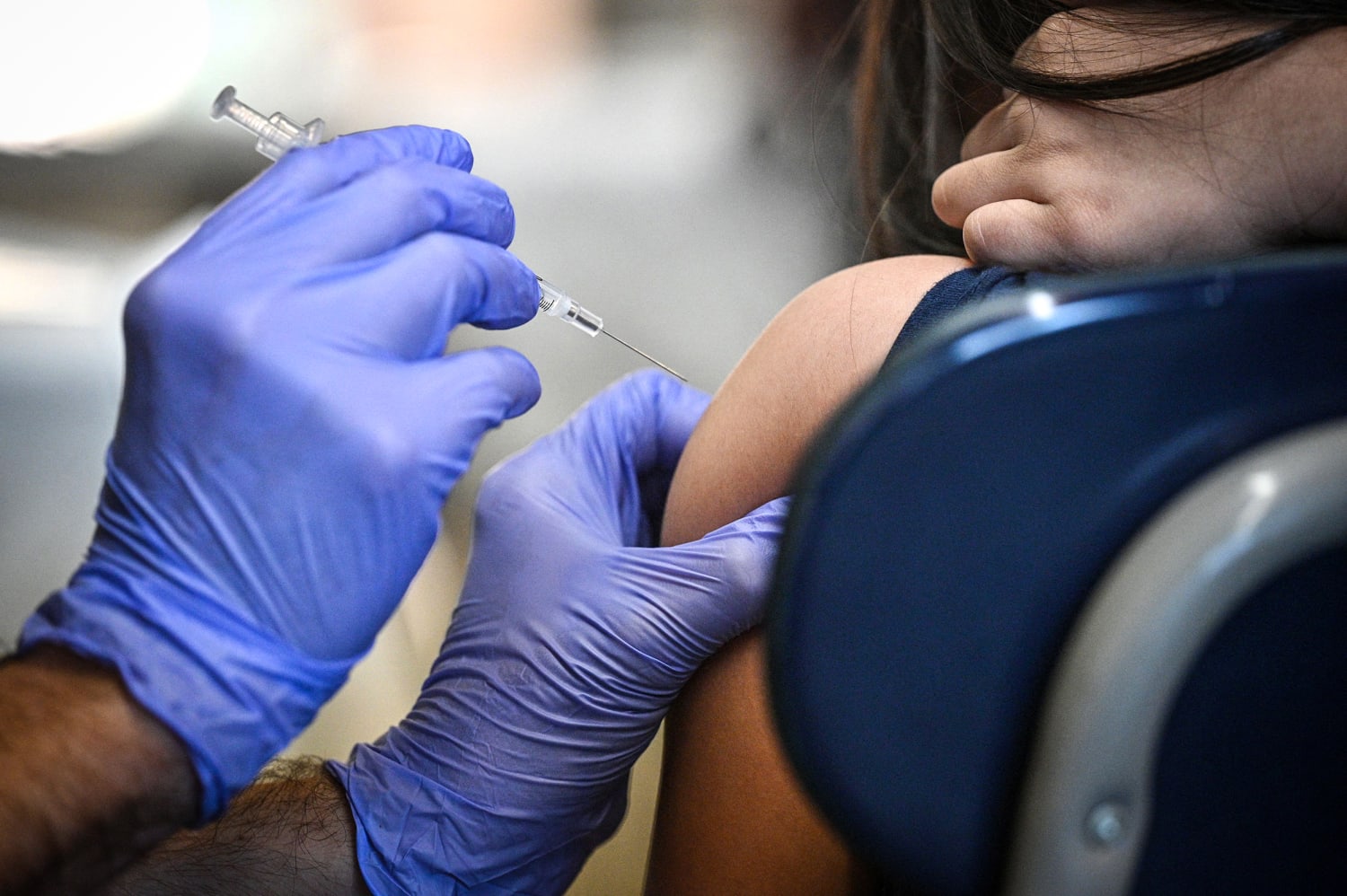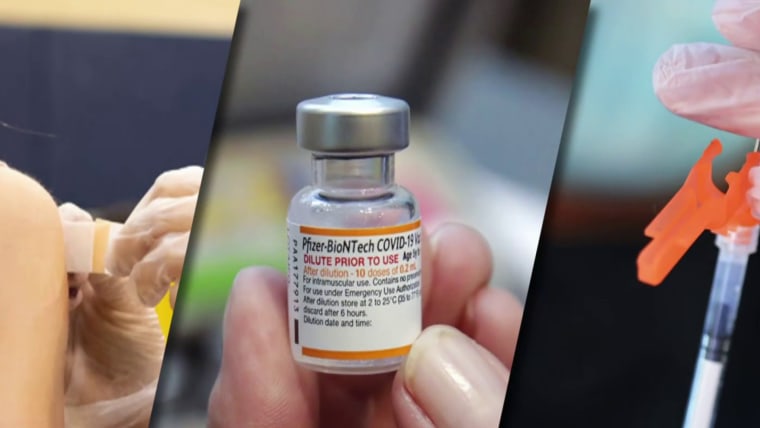WASHINGTON — Elana Banin is counting down the seconds until she can get her baby and toddler vaccinated — a moment she is hoping will finally lift a weight that has continued to bear down on her and similar parents nearly two years into the pandemic.
“There isn’t a day or a minute that goes by that we aren’t acutely aware that our kids are at risk and all of our decisions are calculated accordingly,” Banin, who lives in New York City, said. “Our lives revolve around the fact that they aren’t vaccinated, which in a way I hope desperately will change the second the vaccine is available for their age group. We will be first in line.”
While much of the country has started to return to some semblance of normalcy with the protection they feel from the vaccines, Banin and other parents of children too young to be vaccinated under current rules have felt stuck in pre-vaccine times as they continue to make calculations about how much risk they are willing to take with their unvaccinated children as they juggle preschool closures, skip holiday gatherings and fret over indoor dining and play dates.
“Moms are feeling like they are at a breaking point,” Elaina Preston, who also lives in New York with her two young children, said. “We see family infrequently. We don’t do the classes and the play dates. I can’t bring them out of our 950-square-foot apartment to the library. It is very frustrating. I feel trapped. It is harder to plan my day. It is harder to plan weekends. It is harder to find downtime.”
Vaccines are available for people over the age of 5. But with the prospect of the vaccines being authorized for kids as young as 6 months old by the end of the month, parents with young kids could soon get a mood boost that could translate into an improved outlook for a key group of Democratic voters who have shown lackluster enthusiasm for the president and the direction the country is heading in since cases began to surge again in the summer.
“These are fairly high-turnout voters, but they might skip [the election], they might decide late, they might slip into undecided. They’re really softening in their support and their enthusiasm,” said Celinda Lake, a top Democratic pollster who worked for President Joe Biden’s 2020 campaign. “The vaccine for kids under 5 will have a huge impact.”
If the trend that began with older children holds for which younger kids get vaccinated, those first in line will be more likely to have parents who vote Democratic, have a college education and live in a state Biden won in 2020. While those parents already lean Democratic, it’s a group Biden and Democrats need to shore up ahead of November’s midterm elections.
“What they are looking for is things that will make a real difference for their family, and the vaccine for kids under 5 is something that will have an immediate impact,” Lake said. “It also gives them a better sense of control, and these women are really upset about the instability.”
Biden’s approval rating among women fell 10 percentage points during his first year in office, according to the latest NBC News poll, while other surveys show him struggling with support from younger Democratic women in particular. Just 32 percent said they strongly approve of the job Biden is doing, compared to half of older Democratic women, according to a Morning Consult survey published in October.
Republicans have been courting this group aggressively too and are counting on parental frustration to power them to victory this fall, just as it did for Virginia Gov. Glenn Youngkin in November.
“K-12 parents are a key voting bloc this election, and they are going to turn out in droves for Republicans,” said Liesl Hickey, a Republican strategist who co-founded N2 America, a center-right group focused on winning back the suburbs. “There are a lot of moms who have become single-issue voters on what’s best for their kids.”
Much of the lack of enthusiasm among Democratic women is coming from the strain they have felt during the pandemic, with women more likely to have lost or left their job, often as a result of child care issues, said Kristin Rowe-Finkbeiner, executive director of MomsRising, a political advocacy group that supports many of the policies the Biden administration has been trying to push through Congress.
“Moms that have younger children are definitely struggling in an increased way,” Rowe-Finkbeiner said. “The child care system was hanging by a thread when we were coming into the pandemic, with a tremendous amount of child care deserts, and that has only expanded during the pandemic. People are getting pushed out of slots. Child care centers are opening and closing in ways that make it hard to maintain a work schedule.”
Women made up a smaller share of the job gains in January, accounting for 40 percent of the more than 467,000 jobs added, and there are still 1 million fewer women in the labor force since the start of the pandemic, while male employment is back to its pre-pandemic levels, according to a National Women’s Law Center analysis.
A quarter of parents last month said their child had to quarantine due to a Covid-19 infection or exposure, and nearly half reported some type of school disruption, according to a survey by the Kaiser Family Foundation.
A quarter of parents last month said their child had to quarantine due to a Covid-19 infection or exposure, and nearly half reported some type of school disruption, according to a survey by the Kaiser Family Foundation.
Preston, a New York City physician assistant who specializes in treating children undergoing bone marrow transplants, has chosen to stay in her job throughout the pandemic even though her work with Covid patients has meant she could bring the virus back to her unvaccinated children.
Her life has drastically changed in other ways, though. She said her family canceled their holiday plans with family because she was concerned one of her relatives could infect her children, her children have never had an indoor play date or gone to enrichment classes and she rarely dines out with them.
“I call it Covid depressed,” Preston said. “I see a lot of my friends and colleagues opening up and moving on with life a little more with young children who aren’t yet vaccinated, and I keep thinking, ‘What if my kid is one of the unlucky ones, if my child gets Covid?'”
Not all parents show the same enthusiasm for getting their children vaccinated, though the numbers have been picking up in recent months, according to surveys by the Kaiser Family Foundation.
Among parents with children ages 12 to 17, 61 percent said their child is vaccinated, up from 49 percent in November. For parents of children ages 5 to 11, a third said their child has gotten at least their first dose since it was authorized for that age group in late October.
Among parents with children under 5, about a third said they would get their child vaccinated as soon as possible, and a similar share said they would want to “wait and see,” while another quarter said they would definitely not get their kids inoculated.
A Harris poll of parents with kids under 5 found that about three-quarters of vaccinated parents said they would likely get their kids inoculated, while just 35 percent of unvaccinated parents said the same.
“Overall, parents are a bit more cautious when it comes to kids, even among parents who themselves are vaccinated,” Lunna Lopes, a senior survey analyst with the Kaiser Family Foundation, said.
Virginia Republican state Sen. Siobhan Dunnavant, an OB-GYN who worked with Democrats to pass a bill Tuesday that would allow parents to choose whether or not their kids wear masks in school, said while the omicron wave showed the value of vaccines, mandating them for babies and toddlers would face blowback and further politicize the issue in unproductive ways.
“For parents that are reassured by the vaccine, it’s going to be great peace of mind. But it’s going to be really dangerous for people to try and mandate vaccines for that population,” she said.
“For parents that are reassured by the vaccine, it’s going to be great peace of mind. But it’s going to be really dangerous for people to try and mandate vaccines for that population.”
Va state Sen. Siobhan Dunnavant an OB-GYN
In addition to the birthday parties, classes and trips she hopes her kids can soon enjoy, Banin is hopeful that the vaccine will open up a wider community of moms with young kids for her.
“I have been a mom almost completely alone for the entirety of both my kids’ lives. That has a tremendous effect on our happiness,” Banin said. “I would like for my kids to be surrounded by other human beings, and right now we are so isolated.”
Source: | This article originally belongs to Nbcnews.com











